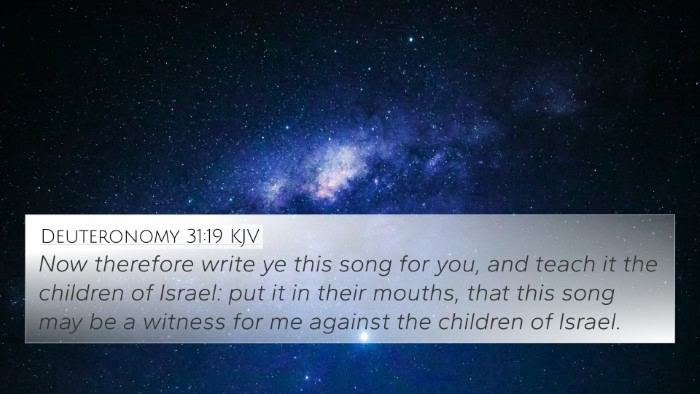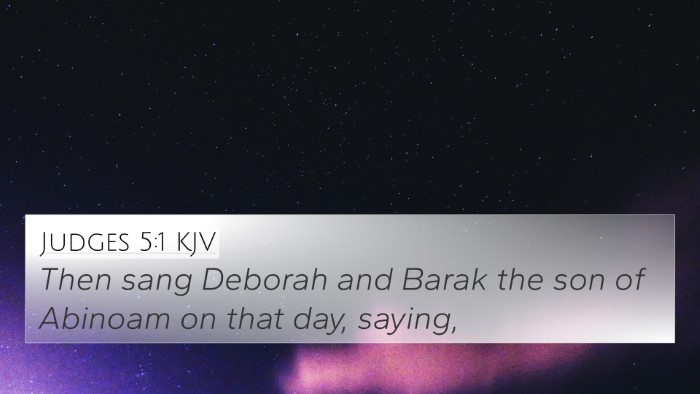Understanding Isaiah 5:1
Isaiah 5:1 is a profound verse that serves as an introduction to a poignant metaphor used by the prophet Isaiah. This verse sets the stage for a deep exploration of Israel's unfaithfulness and God's intentions towards His people.
Verse Context
Isaiah 5:1 states:
"Now will I sing to my well-beloved a song of my beloved touching his vineyard: My well-beloved hath a vineyard in a very fruitful hill."
Summary of Biblical Meaning
This verse introduces a metaphorical vineyard, symbolizing Israel (God's chosen people). Through this metaphor, Isaiah articulates themes of love, care, and expectation in God’s relationship with His people.
Insights from Commentaries
- Matthew Henry: Henry emphasizes the personal nature of God's relationship with Israel. The "well-beloved" signifies God's deep affection for His people, while the vineyard indicates their privileged status.
- Albert Barnes: Barnes highlights the significance of the "fruitful hill," suggesting that it represents the abundant resources and blessings God has provided. It's a place where one expects fruitful results from diligent care.
- Adam Clarke: Clarke notes that Proverbs 10:5 parallels this verse by discussing the importance of diligence and care, indicating that neglect leads to disappointment, which complements the overall message Isaiah conveys.
Thematic Connections
The metaphor of the "vineyard" evokes numerous biblical themes such as judgment, divine care, and the expectation of fruitfulness, aligning with various biblical scriptures:
- Isaiah 27:2-3: Discusses the vineyard of the Lord and its protection.
- John 15:1-5: Jesus refers to Himself as the true vine, illustrating the theme of connection and producing fruit.
- Matthew 21:33-41: The parable of the vineyard reflects judgment against unfaithfulness.
- Psalms 80:8-11: Compares Israel to a vine brought out of Egypt, neglecting the need to flourish.
- Jeremiah 12:10: Also likens the people of God to a vineyard requiring care and attention.
- Romans 11:16-24: Discusses the concept of branches, relating to God's people as a cultivated vineyard.
- Luke 13:6-9: Jesus speaks of a fig tree in a vineyard, emphasizing the need for fruitfulness.
- Malachi 3:10: Encourages the giving of tithes to ensure blessings, reflecting God's provision to His vineyard.
- Hebrews 6:7: Discusses the land that bears good fruit, akin to the expectations placed on Israel as God's vineyard.
- 1 Peter 2:9: Highlights that believers are a chosen generation, signifying the continuation of God's care and expectation for fruitfulness.
Cross-Referencing Biblical Texts
Linking Bible scriptures is crucial for a deeper understanding of Isaiah 5:1. By examining these themes and connections, one can derive a richer interpretation of God’s intentions and the expectations of Israel.
Tools for Bible Cross-Referencing
Many resources can aid in cross-referencing Bible verses effectively:
- Bible Concordance: Useful for finding keywords and related verses.
- Bible Cross-reference Guide: Helps categorize connections between verses.
- Cross-reference Bible Study: A method to delve deeper into thematic issues across scriptures.
- Bible Reference Resources: Collects various interpretations and insights from different commentaries.
- Cross-reference Bible Study Methods: Techniques to understand Biblical themes in context.
Conclusion
Isaiah 5:1 serves as an entry point into the broader narrative of God’s love and expectations for Israel, showcasing the importance of being fruitful as a response to divine favor. By utilizing cross-referencing tools and examining related scripture, one can acquire a profound understanding of the inter-Biblical dialogue present in God’s message throughout the scriptures.


















